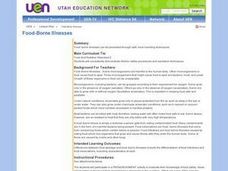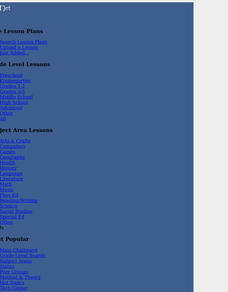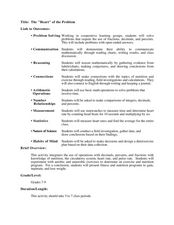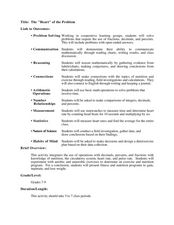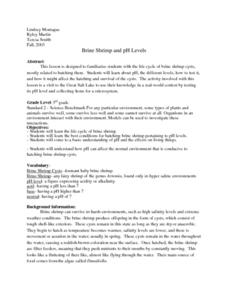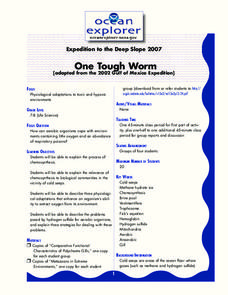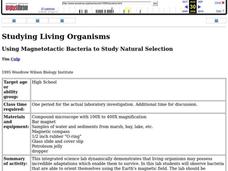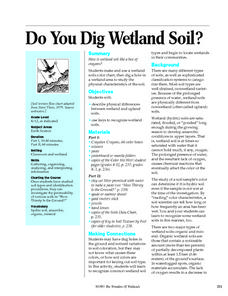NOAA
Deep-Sea Ecosystems – A Tale of Deep Corals
Many have debated which came first, the chicken or the egg, but this lesson debates which came first, the hydrocarbons or the carbonate reef. After a discussion on deep-sea corals, scholars receive a set of questions to research and...
NOAA
Importance of Deep-Sea Ecosystems – How Diverse is That?
When judging diversity of an ecosystem, both species evenness and species richness must contribute. After a discussion of diversity and a guided example using the Shannon-Weaver function, scholars use the same function on two other...
Curated OER
Food-Borne Illnesses
Use this lesson to have your charges consider the differences between food spoilage and food-borne illnesses including the differentiation of food infections and food intoxication, including characteristics of each. Some excellent...
Green Learning
Build Your Own Biogas Generator
Where this is not exactly a lesson plan, it is a terrific outline of how to generate biogas from an animal manure sample. If you are up for the challenge, the generator can be built by your class as a concluding project at the end of an...
Curated OER
Alcoholic Fermentation in Yeast
Biology learners investigate the effect of sucrose concentration on yeast alcoholic fermentation. During the lesson,they compare and contrast the processes of cellular respiration and alcoholic fermentation. They design an experiment to...
Curated OER
Describe Environmental Interrelationships
Students describe environmental interrelationships using list of criteria. They are able to explain organism interaction, based on definitions provided. Also, students can use references and worksheets, to describe effects of pollution...
University City High School
Metabolism Lesson Plan
Not a instructional activity in the traditional sense, this is a collection of resources with which you can craft a instructional activity on metabolic processes. It includes an outline of topics, some brief discussion, and a large array...
Curated OER
Root Beer: Demonstration of fermentation
Name:__________________________________ Class:________ Date:____________
Curated OER
COMPOSTING: WHY BOTHER?
Students explore the composting process and participate in a contest to make the most compost the fastest from the school's kitchen and yard waste.
Curated OER
The "Heart" of the Problem
Students explore mathematical operations while studying nutrition. In this physical fitness lesson, students explore calories, pulse rate, and the circulatory system. Students use mathematical data to create a healthy physical fitness...
Curated OER
The "Heart" of the Problem
Students create an exercise and nutrition program. In this interdisciplinary lesson, students use calculations of exercises plus their corresponding effects on the body and nutritional values of food to derive a health plan. Students...
Curated OER
Health: Food Borne Illnesses
Young scholars discover how to inhibit food borne illnesses by practicing safe food-handling techniques. Among topics they examine are the advantages and disadvantages of using wooden or plastic cutting boards. After studying for the...
Curated OER
What's Up, Doc?
Students explore cardiovascular fitness and create and follow a fitness program. They document the benefits of participating in a fitness program.
Curated OER
Biotech in a Bag
Students carry out a series of experiments using self-locking plastic baggies. Each experiment demonstrates a phenomenon or principle of biotechnology.
Curated OER
Brine Shrimp And Ph Levels
Third graders investigate the different ph levels found in water that is tested using simple measurements. The water samples are taken from a local body of water. The ph levels are used to help indicate areas where shrimp can thrive in...
Curated OER
One Tough Worm
Students explain the process of chemosynthesis and its relevance to biological communities. In this investigative lesson students discuss chemosynthetic communities, then in groups they are assigned a species and are to calculate the gas...
Curated OER
Using A Winogradsky Column to Analyze Microbial Communities
Students use easily obtained materials to study ecological succession in a microbiological community. This investigation is appropriate for a variety of age groups. Elementary Students be fascinated by the changes occurring over time...
Curated OER
Threatened, Endangered & Extinct Lesson Plan
Students examine the basic needs of living organisms. In this science lesson, students study ecosystems and discover that organisms have basic needs that must be met.
Curated OER
Using Magnetotactic Bacteria to Study Natural Selection
Students demonstrate that living organisms may possess incredible adaptations which enable them to survive. They observe bacteria that are able to orient themselves using the Earth's magnetic field and formulate a hypothesis as to how...
Curated OER
Life's Big Questions: Where Did Life Come From?
Students explore the life forms that live in the hot springs of Yellowstone. They examine how microscopic creatures can survive in these extreme conditions. Students perform experiments to observe growth samples and demonstrate how a...
Curated OER
Do You Dig Wetland Soil?
Students study the physical differences between wetland and upland soils. They match colors to the different levels of the soil after digging holes. They create soil color charts and chart the texture of the soils.
Curated OER
Kraut Lab
Students explore the process of fermentation through the process of making Sauerkraut. Students use their observational skills and their five senses to create an articulate description of their lab created sauerkraut. They discuss the...
Curated OER
Using A Winogradsky Column to Analyze Microbial Communities
Students use easily obtained materials to study ecological succession in a microbiological community. They collect water samples from outdoor sources in plastic bottles to observe and record changes.
Other popular searches
- Anaerobic Respiration
- Anaerobic Exercise
- Atp Aerobic Anaerobic
- Anaerobic Fermentation
- Anaerobic Digestion
- Aerobic Anaerobic
- Anaerobic and Aerobic
- Anaerobic Aerobic Exercise
- Anaerobic, Aerobic Exercise
- Aerobic, Anaerobic
- Atp, Aerobic, Anaerobic
- Anaerobic System




